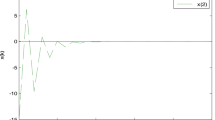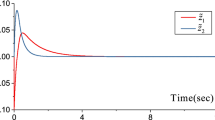Abstract
This paper is concerned with the stabilization problem for a class of nonlinear systems with disturbance. The disturbance model is unknown and the first derivative of disturbance is bounded. Firstly, a general disturbance observer is proposed to estimate disturbance approximatively. Secondly, since the bound of the disturbance observer error is unknown, an adaptive sliding mode controller is designed to guarantee that the state of system asymptotically converges to zero and the unknown bound can be adjusted by an adaptive law. Finally, an example is given to illustrate the effectiveness of the proposed method.
Similar content being viewed by others
References
J. Y. Hung, W. Gao, J. C. Hung. Variable structure control: A survey. IEEE Transactions on Industrial Electronics, vol. 40, no. 1, pp. 2–22, 1993.
L. P. Liu, Z. Z. Han, W. L. Li. Global sliding mode control and application in chaotic systems. Nonlinear Dynamics, vol. 56, no. 1–2, pp. 193–198, 2009.
M. B. R. Neila, D. Tarak. Adaptive terminal sliding mode control for rigid robotic manipulators. International Journal of Automation and Computing, vol. 8, no. 2, pp. 215–220, 2011.
H. Y. Zhou, K. Z. Liu, X. S. Feng. State feedback sliding mode control without chattering by constructing Hurwitz matrix for AUV movement. International Journal of Automation and Computing, vol. 8, no. 2, pp. 262–268, 2011.
L. P. Liu, Z. Z. Han, X. S. Cai. Sliding mode control for polytopic differential inclusion systems. Mathematics and Computers in Simulation, vol. 79, no. 10, pp. 3018–3025, 2009.
A. Kawamura, H. Itoh, K. Sakamoto. Chattering reduction of disturbance observer based sliding mode control. IEEE Transactions on Industry Applications, vol. 30, no. 2, pp. 456–461, 1994.
C. C. Wang, M. Tomizuka. Design of robustly stable disturbance observers based on closed loop consideration using H ∞ optimization and its applications to motion control systems. In Proceedings of the 2004 American Control Conference, IEEE, Boston, MA, USA, vol. 4, pp. 3764–3769, 2004.
T. Umeno, Y. Hori. Robust speed control of DC servomotors using modern two degrees-of-freedom controller design. IEEE Transactions on Industrial Electronics, vol. 38, no. 5, pp. 363–368, 1991.
C. S. Liu, H. Peng. Disturbance observer based tracking control. Journal of Dynamic Systems, Measurement, and Control, vol. 122, no. 2, pp. 332–335, 2000.
S. K. Park, S. H. Lee. Disturbance observer based robust control for industrial robots with flexible joints. In Proceedings of the International Conference on Control, Automation and Systems, IEEE, Seoul, Korea, pp. 584–589, 2007.
X. Xiong, M. Saif. Unknown disturbance inputs estimation based on a state functional observer design. Automatica, vol. 39, no. 8, pp. 1389–1398, 2003.
W. H. Chen. Disturbance observer based control for nonlinear systems. IEEE/ASME Transactions onMechatronics, vol. 9, no. 4, pp. 706–710, 2004.
X. J. Wei, L. Guo. Composite disturbance-observer-based control and terminal sliding mode control for non-linear systems with disturbances. International Journal of Control, vol. 82, no. 6, pp. 1082–1098, 2009.
X. J. Wei, H. F. Zhang, L. Guo. Composite disturbance-observer-based control and terminal sliding mode control for uncertain structural systems. International Journal of Systems Science, vol. 40, no. 10, pp. 1009–1017, 2009.
X. J. Wei, H. F. Zhang, L. Guo. Composite disturbance-observer-based control and variable structure control for non-linear systems with disturbances. Transactions of the Institute of Measurement and Control, vol. 31, no. 5, pp. 401–423, 2009.
Author information
Authors and Affiliations
Corresponding author
Additional information
This work was supported by National Natural Science Foundation of China (Nos. 61074011 and 60904023).
Lei-Po Liu graduated from Henan Normal University, China in 2004. He received his M. Sc. degree from Henan Normal University in 2007 and Ph.D. degree in control theory and control engineering from Shanghai Jiao Tong University, China in 2011. He is currently an associate professor in Henan University of Science and Technology, China.
His research interests include sliding mode control, robust control and differential inclusion systems.
Zhu-Mu Fu received his Ph.D. degree in control theory and control engineering from Southeast University, China in 2007. Now, he is an associate professor in Henan University of Science and Technology, China. His interests include switch system and nonlinear control.
Xiao-Na Song received her Ph.D. degree in control theory and control engineering from Nanjing University of Science and Technology, China in 2011. Now, she is an associate professor in Henan University of Science and Technology, China.
Her interests include fuzzy system and robust control.
Rights and permissions
About this article
Cite this article
Liu, LP., Fu, ZM. & Song, XN. Sliding mode control with disturbance observer for a class of nonlinear systems. Int. J. Autom. Comput. 9, 487–491 (2012). https://doi.org/10.1007/s11633-012-0671-z
Received:
Revised:
Published:
Issue Date:
DOI: https://doi.org/10.1007/s11633-012-0671-z




